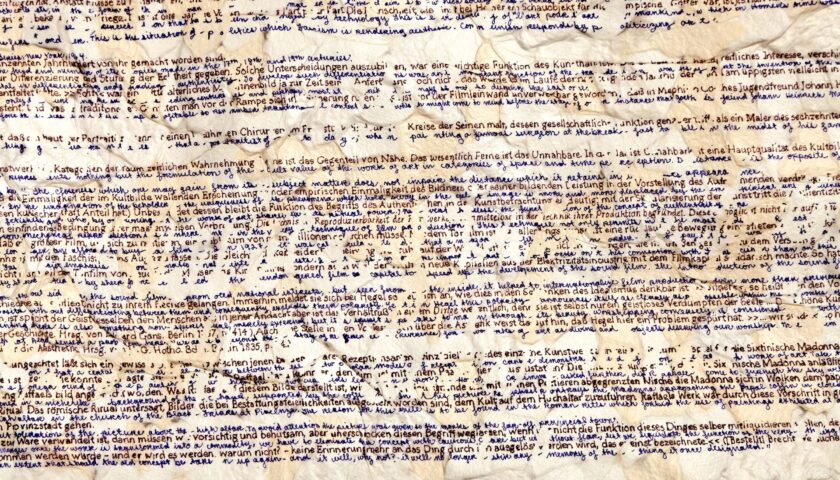Contrary to the rather narrow reception during his lifetime, Walter Benjamin’s work has generated widespread and international interest in the last few decades. Seeing Benjamin as a non-conformist intellectual, however, runs the risk of overlooking one of the essential characteristics of his work: his engagement with political organizations and social movements through a variety of media, such as periodicals and monographs. Interpretations isolating and idealizing “the thinker” do not grasp what renders Benjamin’s work most interesting today, namely his innovative work with concepts as a result of the intensive study of heterogeneous materials, including a vast collection of materials assembled and categorized by Benjamin himself, which provides the necessary foundation of his theorizing and is essential for its understanding. If his writings are only read as cultural, literary, media studies or philosophical investigations, this methodological aspect of his theoretical output remains unexplored.
This workshop is interested in the relation between Benjamin’s work with different kinds of material and its conceptual articulation. The point of departure will be Benjamin’s working notes (Arbeitskonvolute in German, which are elaborate and systematized collections) dealing with sociohistorical and political topics (e.g. the working notes of his Arcades Project E: Haussmannization, Barricade Fighting, U: Saint-Simon, Railroads, V: Conspiracies, Compagnonnage, W: Fourier, X: Marx, a: Social Movement, k: The Commune). These notes should neither be read as mere collections nor as a hodgepodge from which passages can be extracted randomly and integrated into a presumed theory. Rather, Benjamin’s method should be carved out by confronting both reciprocally: the material collections and sources, on the one hand, and the concepts and theory he developed, on the other. Besides the working notes, we will also examine other sources mentioned in Benjamin’s letters.
Furthermore, Benjamin was an avid reader of papers and journals. This aspect of his work merits particular attention because he adopted his style of writing, including the concepts he used, in relation to the specific context in which he published, while simultaneously intervening critically. Therefore, at least a cursory reading of those journals was inevitable for him to position himself with regard to their specific content and orientation.
Submissions can cover but are not limited to the following topics:
- The journal “Die Kreatur“ (1926-1930), where Benjamin’s travel report “Moskau“ was published, and his positioning to the journal
- The journal “Die Neue Zeit“ (1883-1923), Benjamin’s working notes “Excerpts from Die Neue Zeit“ (in: Walter-Benjamin-Archiv, MsNZ 1397-1707); also his essay “Eduard Fuchs der Sammler und der Historiker [Eduard Fuchs, Collector and Historian] (1937)
- The journal “Die Gesellschaft“ (1924-1933), its political and theoretical orientation, as well as Benjamin’s positioning in his extented reviews published in the journal: “Linke Melancholie“ [Left Melancholy], “Ein Außenseiter macht sich bemerkbar/Politisierung der Intelligenz“ [An Outsider Makes His Mark], “Krisis des Romans“ [The Crisis of the Novel], “Theorien des deutschen Faschismus“ [Theories of German Fascism]
- Benjamin’s reception of contemporary political philosophy and philosophy of right (a.o. Otto Kirchheimer, Karl Korsch, Carl Schmitt)
- Arthur Rosenberg’s “Geschichte des Bolschewismus“ (1932) [A History of Bolshevism], “Die Entstehung der deutschen Republik“ (1928) [The Birth of the German Republic] (later published under the title “Entstehung und Geschichte der Weimarer Republik“ [The Birth and the History of the German Republic]), as well as Benjamin’s reception of it.
- Benjamin’s reception of the work of Georg Lukács, a.o. “Die Seele und die Formen“ [Soul and Form] (1911), “Theorie des Romans“ [The Theory of the Novel] (1916), “Geschichte und Klassenbewußtsein“ [History and Class Consciousness] (1923), “Größe und Verfall des Expressionismus“ [Expressionism: Its Significance and Decline] (1934), “Es geht um den Realismus“ [Realism in the Balance] (1938)
- Benjamin’s studies on the French Revolution 1789, the July Revolution 1830, the revolutions in Europe in 1848, the Paris Commune 1871, as well as Benjamin’s use of them in his own writings
- Benjamin’s positioning vis-à-vis soviet cultural politics
- Benjamin’s reception of the french Utopists, such as Henri de Saint-Simon and Charles Fourier as well as Pierre-Joseph Proudhon, Auguste Blanqui, and Paul Lafargue
- Benjamin’s comments on Bertolt Brecht’s epic theatre
- Benjamin’s dealing with Jewish, Islamic and also Christian sources and theories
The workshop will combine lectures (followed by Q&A) with a collective working method. Through the organization of panels, we will examine a variety of themes in Benjamin’s work including the relation between material and concept, working notes and finished text, as well as intellectual relations and theoretical references to other theories and concepts within his work and the work of others. These panels will consist of two 20-minute lectures. The first will focus on a primary source while the second will take Benjamin’s excerpts and theoretical developments into consideration. The panelists are asked to present a common statement and summary before the discussion in order to highlight aspects or theses on the specific relation between material and concept within their treatment of the subject. With the help of the online platform www.benjaminsmaterial.org, preparation will be coordinated and the papers can be examined in light of each other. The contributions will be available to participants three weeks prior to the beginning of the workshop in order to facilitate an exchange between the panelists dealing with the underpinning ›material‹ and those dealing with the elaborated ›theory‹.
Among all the disciplines within the Humanities, this workshop explicitly seeks to attract young scholars in history and the social sciences (up to about ten years after finishing their Ph.D.) and encourages them to write a proposal, especially if they have not worked on Benjamin yet, but on one of the subjects mentioned above. Please send your abstracts via e-mail or in PDF format in English or German (MAXIMUM 500 words) to contact@benjaminsmaterial.org. Your proposal should contain the following information: title, subject, problem/question and your contact information. Proposals for an entire panel containing a double perspective on ›material‹ and development of ›theory‹ can be handed in by a team of two scholars as well.
Participation will require a passive understanding of both German and English. We will reply to your proposal before October 31st, 2016. Hotel accommodations (within proximity) will be covered, as well as up to 250 € in travel expenses. If travel expenses are much higher and cannot be covered by an institution you might be affiliated to, we ask you not to refrain from submitting a proposal. We will try to seek solutions in that case. The location of the workshop is wheelchair accessible.
Location: Berlin, Zentrum für Literatur- und Kulturforschung
Date: March 24th – March 26th 2017
Conception and Organization: Konstantin Baehrens (Universität Potsdam), Jan Loheit (Europa-Universität Viadrina Frankfurt/Oder), Nicos Tzanakis-Papadakis (Freie Universität Berlin), Frank Voigt (Universität Osnabrück)
Submission deadline: 1 October, 2016
Acceptance notification: 31 October, 2016
More info: http://www.benjaminsmaterial.org/











